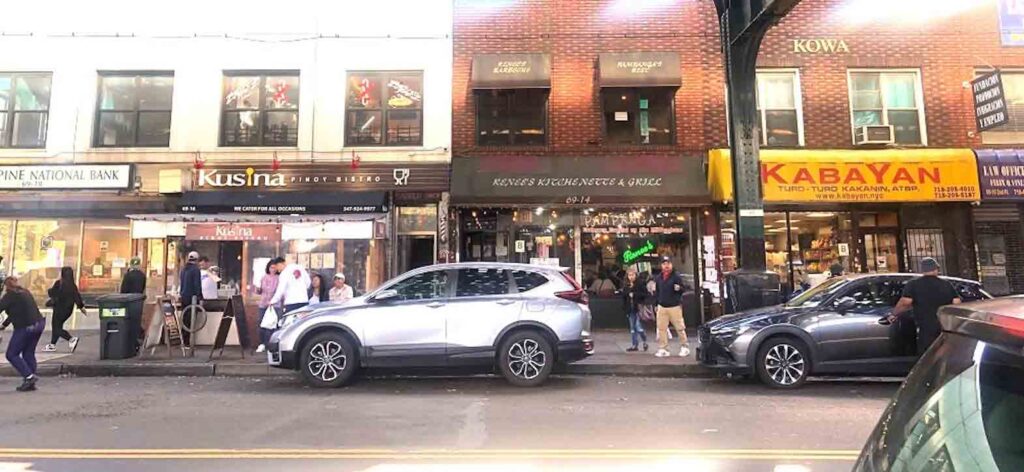Filipino businesses thrive in NY, but no one knows how many there are

Roosevelt Avenue in Queens: One Filipino business after another. (TheFilAm)
NEW YORK CITY – Owning six Filipino restaurants — two that opened during the pandemic — should qualify Cherry Castellvi as a flourishing restaurateur in the Filipino community in the New York metro area.
Putting her career of 24 years as a physical therapist behind her, she opened her first Kabayan (meaning compatriot) Restaurant on Queens Boulevard after her ex-husband sold their family restaurant Perlas ng Silangan on Roosevelt Avenue. It wasn’t her first rodeo in the food industry, but it was her first time as a solo entrepreneur after her marriage ended.
Cherry’s chain of Kabayan restaurants across Queens and Long Island began with the opening of Kabayan Filipino Restaurant in June of 2015. She is one of many Filipino food entrepreneurs who have opened restaurants in New York mainly to bring Philippine cuisine to mainstream America.
In Queens, The FilAm counted some 50 different Filipino eateries and food stores, from family restaurants, to beer houses and bakeries. The East Village in Manhattan is another area of the city where there are many Filipino dining spots. Filipino nurses who work in area hospitals such as Mount Sinai, Bellevue or NYU Langone say Filipino restaurants are vital to their community as gathering places and as providers of food and nourishment connecting them to their culture.
Food and restaurant businesses are of many industries that Filipinos in New York are involved in, according to a 2012 U.S. Census Survey of Business Owners. Filipino Americans own a wide range of businesses ranging from mining operations to dry cleaning services.
Consul General of the Philippines in New York Senen Mangalile said Filipino American entrepreneurs are, “living proof of our people’s ability to assimilate in their communities and find opportunities where they may.”
Census data
The 2012 SBO study represents the last time the U.S. Census identified the ethnicities of business owners. Data after 2012 are called “Annual Business Surveys.” They are no longer done every five years and they are not race-specific, according to Census Public Affairs Specialist Jewel Jordan. She did not say why they stopped collecting data on race after 2012.
“Unfortunately, because that survey is annual, we cannot produce ethnicity data beyond whether the business owner was Hispanic or Latino,” she said.
There is no available data showing the total number of Filipino businesses in the state, their total investment value and how many people they employ. There are approximately 2.3 million small businesses across New York State, according to the 2022 Small Business Profile of the Small Business Administration’s Office of Advocacy. Of this number, Asians account for 322,737 of the businesses. But there is no way of knowing the size of Filipinos’ contributions to the state’s economy or in which sectors Filipinos have made the biggest impact.
You may also like: Fil-Am entrepreneurs huddle in NY
“We do not have an exact count (of the small businesses) because not all of them register with us,” said Consul General Mangalile when asked for the size and extent of Filipino businesses in the city.
Out of an estimated 220,000 small businesses in New York City, about 47,141 are Asian-owned, one-third of them located in Queens, according to a 2021 study by the Center for an Urban Future.

Kabayan’s Cherry Castellvi: She owns six restaurants in Queens and Long Island, two of them opened during the pandemic. (Photo: Lumen Castaneda)
In Queens, Filipino businesses are mostly clustered along Roosevelt Avenue including restaurants, doctors offices, immigration lawyers, food stores and remittances centers. Last year, a tiny corner of Roosevelt Avenue and 70th Street was named Little Manila in recognition of the growing and dynamic presence of Filipino businesses.
Biggest – food and restaurants
To get a better picture of Filipino small businesses in New York City, we spoke to social media blogger Maine Anderson. Maine runs the popular Pinoys of New York (PONY) page on Facebook.
She believes the biggest Filipino business sectors are in 1) food and restaurants, 2) health care, and 3) entertainment and concert producing. Professional services such as offices for doctors, lawyers and accountants, and construction are also money earners for Filipinos, she added.
Maine’s blog has 12,000 followers with 1,500 more “pending and waiting to be approved.” It is a go-to site for companies that want to advertise jobs, fundraising and concert events.
“These are the businesses that commonly reach out to us,” she said.
While these businesses have the advantage of visibility, they may not necessarily have the biggest financial exposure. The restaurant business is the closest to the Filipino experience because food is always relatable, and the opening and closing of a restaurant is always “news” to the community. But restaurant ownership is only part of the story.
On assuming his position in January as head of the Philippine Consulate General, Mangalile called for a survey of Filipino businesses across the Northeast covering the 10 states under his jurisdiction.
Tepid response to survey
Fewer than 50 companies heeded the call and registered for the fledgling Filipino Business Directory. The idea behind the initiative is to compile a list of Filipino-owned enterprises, a dataset sorely lacking as a community resource. The consulate has a list of community organizations, a list of restaurants, a list of journalists, but no list of small businesses.
“Nobody seems interested in studying small businesses,” says a noted academic researcher. He could not explain why “there is no interest” in the subject.
The Fil-Am reached out to the NY Department of Small Businesses Services and was told they do not collect information on the ethnicity of business owners registered with them.
“And even if I have that information I am not at liberty to provide it,” said an employee from the SBS office.
“Filipino-American entrepreneurs represent the continuing evolution of our diaspora, from the pensionadosat the dawn of the 20th century, hired hands in agriculture in the ‘20s, to the professionals in the ‘60s, said Mangalile. He would like to see Filipino business entities explore and be aware of all services and opportunities local government has to offer. “It is their right as taxpayers,” he said.
He expressed the hope that younger entrepreneurs would “dream big” so that their products and services would “cater to the entire American market and not just to a segment of it.”
This story was produced as part of the Small Business Reporting Fellowship, organized by the Center for Community Media and funded by the NYC Mayor’s Office of Media and Entertainment.

